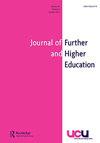毅力对菲律宾远程学习本科生学术活力的影响
IF 2.4
Q1 EDUCATION & EDUCATIONAL RESEARCH
引用次数: 0
摘要
先前的研究表明,在COVID-19大流行期间,学术浮力或日常学术弹性变得更加重要。目前的研究是为了确定实现长期愿望的决心和激情,或勇气,是否会促进从事远程学习的菲律宾本科生的学术浮力。通过配额抽样,我们招募了114名年龄在18岁及以上的菲律宾大学生(男57人,女57人)完成了一项在线调查,调查内容包括毅力量表(TMGS)和学术浮力量表(ABS)。层次回归分析显示,在控制人口变量的情况下,毅力对学业浮力有积极影响。研究还发现,适应情况的毅力维度是学术浮力的最重要预测因素,参与者的人口特征与他们应对和保持日常浮力的能力无关。研究结果提供了关于集体主义背景下毅力的三角模式和学术浮力之间关系的有趣见解。本文章由计算机程序翻译,如有差异,请以英文原文为准。
The impact of grit on the academic buoyancy of Filipino undergraduate students engaged in distance learning
ABSTRACT Previous studies have revealed that academic buoyancy, or everyday academic resilience, have become more important amidst the COVID-19 pandemic. The current study was conducted to ascertain if determination and passion for attaining long-term aspirations, or grit, would facilitate the academic buoyancy of Filipino undergraduate students who are engaged in distance learning. Through quota sampling, 114 Filipino college learners (57 males, 57 females) aged 18 and above were recruited to complete an online survey which included the Triarchic Model of Grit Scale (TMGS) and Academic Buoyancy Scale (ABS). Hierarchical regression analysis revealed that grit had a positive impact on academic buoyancy while controlling for demographic variables. It was also identified that the grit dimension of adaptability to situations was the most significant predictor of academic buoyancy and that the demographic characteristics of the participants were not associated with their capability to cope and stay afloat on a day-to-day basis. The results provide interesting insights about the relationship between the triarchic model of grit and academic buoyancy in the collectivist setting.
求助全文
通过发布文献求助,成功后即可免费获取论文全文。
去求助
来源期刊

JOURNAL OF FURTHER AND HIGHER EDUCATION
EDUCATION & EDUCATIONAL RESEARCH-
CiteScore
5.20
自引率
4.30%
发文量
80
期刊介绍:
Journal of Further and Higher Education is an international, peer-reviewed journal publishing scholarly work that represents the whole field of post-16 education and training. The journal engages with a diverse range of topics within the field including management and administration, teacher education and training, curriculum, staff and institutional development, and teaching and learning strategies and processes. Through encouraging engagement with and around policy, contemporary pedagogic issues and professional concerns within different educational systems around the globe, Journal of Further and Higher Education is committed to promoting excellence by providing a forum for scholarly debate and evaluation. Articles that are accepted for publication probe and offer original insights in an accessible, succinct style, and debate and critique practice, research, theory. They offer informed perspectives on contextual and professional matters and critically examine the relationship between theory and practice across the spectrum of further and higher education.
 求助内容:
求助内容: 应助结果提醒方式:
应助结果提醒方式:


